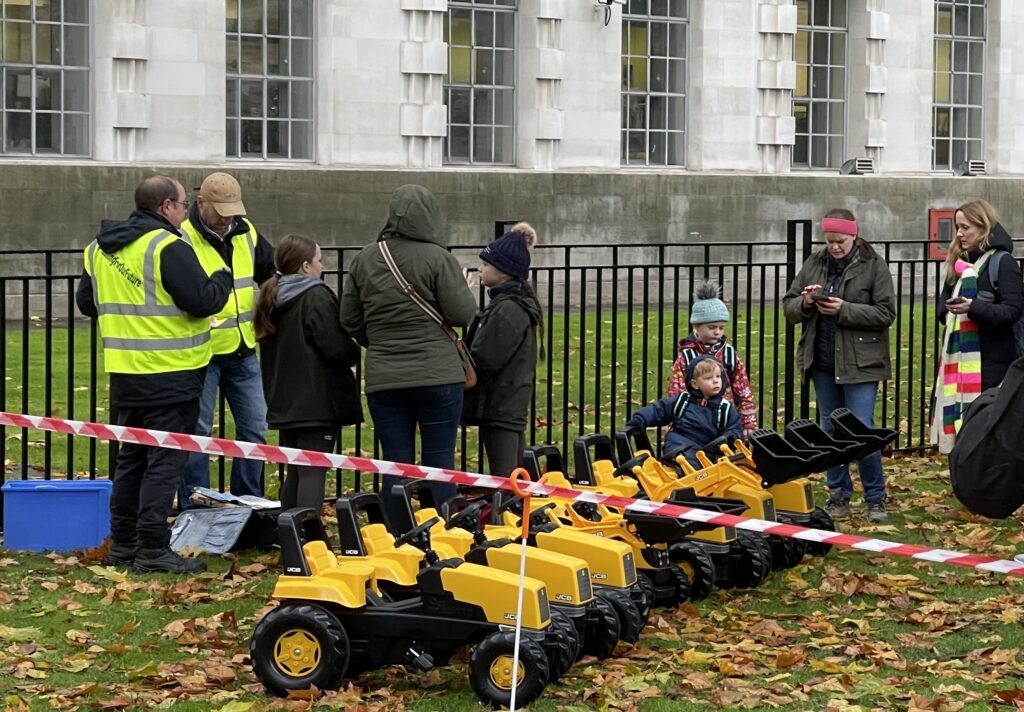
Farmers and their supporters made it clear that the fight is not over and that the protest in London on Tuesday was only the beginning.
Photo: Nick Hallett
More than 10,000 farmers and their supporters descended on Westminster on Tuesday in a dramatic display of rural defiance against the government’s proposed inheritance tax reforms.
The protest, marked by placards reading “No farming, no food, no future” and children cycling around Parliament Square in toy tractors highlighted the depth of anger across the agricultural sector.
Farmers of all ages, union leaders, and prominent figures like TV presenter Jeremy Clarkson joined the demonstration to demand a reversal of changes threatening the survival of family-run farms.

Clarkson—whose show “Clarkson’s Farm” has made him one of the most prominent voices for British agriculture—delivered a passionate speech to the crowd, describing the reforms as a “light hammer blow to the back of the head” for an industry already struggling with soaring costs and regulatory pressures.
“For the sake of everybody here, and all the farmers stuck at home today, paralysed by a fog of despair over what’s been foisted upon them, I beg the government to accept this was rushed through, wasn’t thought out, and was a mistake,” he said. Urging ministers to reconsider, Clarkson added, “That’s the big thing to do—admit it and back down.”
Clarkson’s remarks were echoed by Kemi Badenoch, leader of the Conservative Party, who has called the reforms a “family farms tax” and pledged to overturn them if her party regains power. “Farming is the backbone of this country,” Badenoch said. “We know the burden farmers are carrying and want you to know we have your backs.”
The demonstration in Whitehall was as symbolic as it was vocal. Families carried banners, and some farmers even brought boxes of vegetables, which they donated to a food bank set up by the organisers. Children on toy tractors carried signs, including one that read, “Let me farm like my daddy,” underscoring the concern for future generations. One farmer from Wiltshire summed up the sentiment: “I’m here for their future, their farms.”
“Farmers of the future” cycling their way around Parliament Square in toy tractors after (adult) protesters were told they would face arrest for blocking London roads with their vehicles pic.twitter.com/LshzOITaHZ
— Rachael Burford (@RachaelBurford) November 19, 2024
The protest follows sweeping changes to inheritance tax announced in Chancellor Rachel Reeves’ recent Budget. Under the new rules, which will take effect in April 2026, agricultural property relief (APR) and business property relief (BPR) will be capped at £1 million in combined assets for full 100% tax relief. Assets above this threshold will be taxed at an effective rate of 20%.
Farmers argue that the new limit, which includes the value of land, machinery, and livestock, will impact far more than the government’s estimate of 500 estates. Critics warn that even small and mid-sized family farms could face crippling inheritance tax bills.
Industry experts have outlined the financial toll these changes could impose. Luke Lodge, of Evelyn Partners, estimated that a family farm of 1,000 acres could face an inheritance tax bill of £1.8 million. Farmers have the option to pay these bills over ten years, but many say this is not feasible given the already slim profit margins in farming. Selling off land or assets may become the only option for many, raising fears that multi-generational farms will be lost.
The National Farmers’ Union (NFU) and the Country Land and Business Association (CLA) have fiercely criticised the policy, claiming it will affect tens of thousands of farms. “This threatens the family farm,” said Tom Bradshaw, NFU President. The CLA estimates that up to 70,000 estates could be impacted, while government figures claim that 72% of farms will remain unaffected—a claim protesters vehemently reject.
Jeremy Clarkson, in his speech, highlighted the financial pressures that farmers already face. “A tractor, £200,000 for a medium-sized one, a combine, half a million pounds—all the equipment costs a fortune. And if you try to price what you’re selling to accommodate that, there’s just a lot of moaning,” he said.
Reflecting on his own farming experience, Clarkson noted the complexities of the profession, from environmental challenges to public misunderstandings. “We’re just trying to make breakfast, lunch, and dinner,” he said, adding, “It’s just this endless whingeing, and there’s no money in it.”

Despite the large turnout and the strong messages delivered, the government has shown no indication of reconsidering the policy. Reeves has argued that the reforms are aimed at making tax reliefs “fairer” and reducing abuse of the system, which currently costs taxpayers £219 million annually. However, speaking to reporters before his speech, Clarkson dismissed this justification, accusing Labour of using a “blunderbuss” approach that disproportionately harms small and medium-sized farms.
“If she’d have wanted to take out the likes of [businessman] James Dyson and investment bankers and so on, she would have used a sniper’s rifle,” he said. “But she’s used a blunderbuss and she’s hit all this lot.”
As the crowd began to disperse, the mood remained resolute. Farmers and their supporters made it clear that the fight is not over. “I know a lot of people across the country, in all walks of life, took a bit of a kick on the shin with that Budget,” Clarkson concluded. “You lot got a knee in the nuts.” For Britain’s farmers, the battle to protect their future continues.
